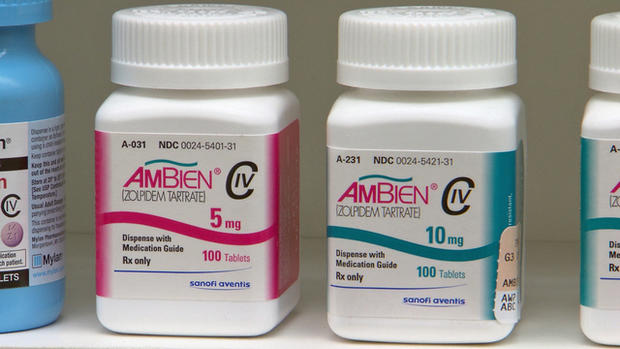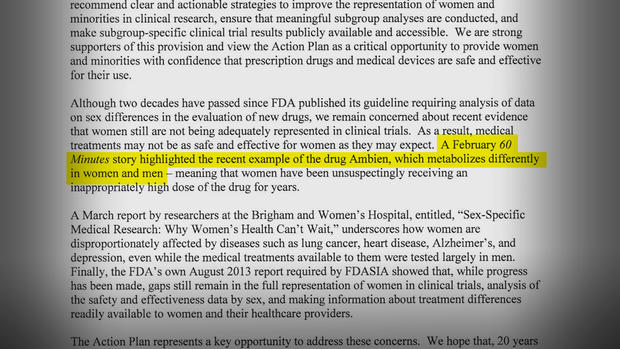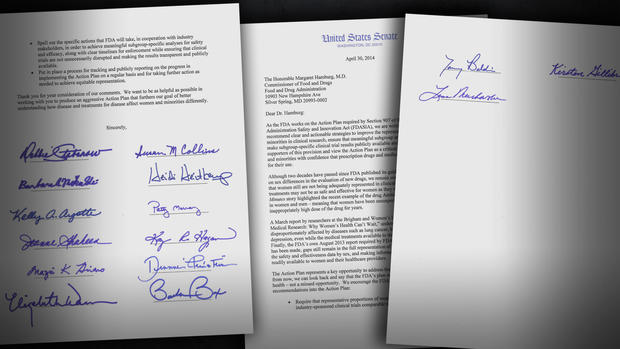60 Minutes helps pave way for change at NIH, FDA
When Lesley Stahl's 60 Minutes report "Sex Matters" aired in February, the story appeared to strike a nerve in Washington, D.C.
The National Institutes of Health announced Wednesday that it will change its policies to ensure that female animals and cells are included, and sex differences analyzed, at all stages of the scientific process.
As Stahl and 60 Minutes producer Shari Finkelstein reported, differences between the sexes are dangerously understudied in scientific and medical research. And, drugs can affect men and women differently, but scientists routinely study only male animals, fearing that female hormone fluctuations might muddy their results.
"It has been remarkable to see the movement on this issue just in the few months since we broadcast our story," Finkelstein says.
In an article published in the journal "Nature," Dr. Francis Collins, director of the NIH, and Dr. Janine A. Clayton, director of the NIH's Office of Research on Women's Health, told scientists the NIH will start "requiring sex and gender inclusion plans in preclinical research."
The article says the NIH plans to roll out these improved policies in phases beginning in October 2014 with a goal to "transform how science is done."
Members of Congress were also moved to act after Stahl and Finkelstein's 60 Minutes report aired. In April, a bipartisan group of 15 women senators wrote a letter to the U.S. Food and Drug Administration, urging it to improve the representation of women in drug trials.
"We remain concerned about recent evidence that women still are not being adequately represented in clinical trials," the letter reads. "A February 60 Minutes story highlighted the recent example of the drug Ambien, which metabolizes differently in women and men."
The group was led by Sen. Debbie Stabenow (D-MI) and includes the signatures of Senators Barbara Boxer (D-CA), Elizabeth Warren (D-MA), Kelly Ayotte (R-NH), Tammy Baldwin (D-WI), Susan Collins (R-ME), Dianne Feinstein (D-CA), Kirsten Gillibrand (D-NY), Kay Hagan (D-NC), Heidi Heitkamp (D-ND), Mazie Hirono (D-HI), Barbara Mikulski (D-MD), Lisa Murkowski (R-AK), Patty Murray (D-WA), Jeanne Shaheen (D-NH).
"I thought the 60 Minutes piece was very important," Sen. Stabenow tells 60 Minutes Overtime in a phone interview. "It amplified something that I have been concerned about for some time, and it helped us to create a new energy around the issue."
Sen. Stabenow says the 60 Minutes report brought light to an issue that affects her personally. Heart disease runs in her family, and although heart disease is the leading killer of both men and women, women's symptoms can differ from men's and are more frequently missed.
Sen. Warren has a similar personal connection to the issue.
In March, at a Women's Health Summit at Brigham & Women's Hospital in Boston, Warren spoke of her mother's unexpected death. Warren said the autopsy would later prove she had advanced coronary disease.
"My mother had gone to the doctor on a very regular basis...and yet, no one had ever considered the possibility that she had coronary disease. I've always assumed that's because she was a woman," Warren said.
Later this month, the letter to the FDA from the 15 women senators is expected to be signed by a group of congresswomen. Rep. Lois Capps (D-CA) has already collected 14 signatures from congresswomen, but she tells 60 Minutes Overtime that she expects more soon.
"I'm appreciative that Lesley did this piece, it affects everyone and hits home why this is a problem," Rep. Capps says of the February 60 Minutes report. "We all deserve to have confidence that when you have an approved FDA prescription, it is safe and effective for use."
In August, the FDA is expected to release an action plan detailing its strategies for promoting greater diversity in clinical trials. According to an email statement from Tara Goodin, a press representative for the FDA, the agency expects to release a plan "that can have a real and actionable impact."
Goodin says the FDA is reviewing the letter from the senators and will give a direct response.
"The FDA agrees that encouraging diversity is vital for biomedical research and for ensuring the health needs of patients across the demographic spectrum," Goodin says. "The agency is striving to develop a well-informed action plan for improving data collection, analysis and communication about demographic subgroups in clinical trials of FDA-regulated human medical products."
Sen. Stabenow says she is aware of the upcoming FDA action plan, and she hopes that the senators' letter has communicated to the FDA that she and her colleagues have high expectations.
"We expect this to be a robust action plan," Sen. Stabenow says. "There's no excuse to not make sure clinical trials for drugs and devices contemplate differences between men and women, different races, different ethnicities. We don't want any more excuses or any more delays."


